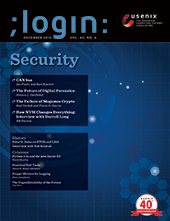USENIX supports diversity, equity, and inclusion and condemns hate and discrimination.
Practical Perl Tools: OAuth2 in Situ
;login: Enters a New Phase of Its Evolution
For over 20 years, ;login: has been a print magazine with a digital version; in the two decades previous, it was USENIX’s newsletter, UNIX News. Since its inception 45 years ago, it has served as a medium through which the USENIX community learns about useful tools, research, and events from one another. Beginning in 2021, ;login: will no longer be the formally published print magazine as we’ve known it most recently, but rather reimagined as a digital publication with increased opportunities for interactivity among authors and readers.
Since USENIX became an open access publisher of papers in 2008, ;login: has remained our only content behind a membership paywall. In keeping with our commitment to open access, all ;login: content will be open to everyone when we make this change. However, only USENIX members at the sustainer level or higher, as well as student members, will have exclusive access to the interactivity options. Rik Farrow, the current editor of the magazine, will continue to provide leadership for the overall content offered in ;login:, which will be released via our website on a regular basis throughout the year.
As we plan to launch this new format, we are forming an editorial committee of volunteers from throughout the USENIX community to curate content, meaning that this will be a formally peer-reviewed publication. This new model will increase opportunities for the community to contribute to ;login: and engage with its content. In addition to written articles, we are open to other ideas of what you might want to experience.

In the last column I threw a little hissy fit around the authentication options for working with the WordPress REST API. In it, I made noises about the adoption of OAuth 2.0 over version 1.0a and further grumbled about the backwards incompatibility (not to mention some of the politics around the changes) between the two versions. All of this piqued the interest of my editor who asked me to write some more on the topic. I’m still not thrilled about the OAuth situation, but I thought I would try to redeem myself by providing a column around the subject based on an actual piece of code that had to authenticate using OAuth2. This still won’t address the OAuth 1.0a questions, but perhaps future columns will drag me kicking and screaming in that direction as well. One brief aside about version 1.0a because I need to make a slight correction: in the previous column I had suggested that 2.0 had all but supplanted 1.0a in the world. I’ve recently been discovering a few pockets of 1.0a (for example, Twitter’s API, probably for historical reasons, seems to consist of this strange mishmash of the two), so I don’t think 1.0a can be considered dead quite yet. Maybe we’ll make with the Twitter in a future column.

